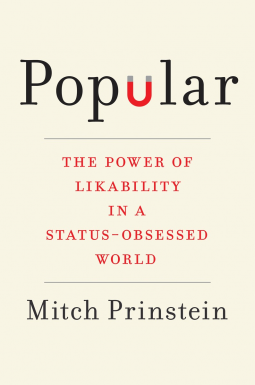
Popular
The Power of Likability in a Status-Obsessed World
by Mitch Prinstein
This title was previously available on NetGalley and is now archived.
Buy on Amazon
Buy on BN.com
Buy on Bookshop.org
*This page contains affiliate links, so we may earn a small commission when you make a purchase through links on our site at no additional cost to you.
Send NetGalley books directly to your Kindle or Kindle app
1
To read on a Kindle or Kindle app, please add kindle@netgalley.com as an approved email address to receive files in your Amazon account. Click here for step-by-step instructions.
2
Also find your Kindle email address within your Amazon account, and enter it here.
Pub Date Jun 06 2017 | Archive Date May 30 2019
PENGUIN GROUP Viking | Viking
Description
A leading psychologist examines how our popularity affects our success, our relationships, and our happiness—and why we don’t always want to be the most popular
No matter how old you are, there’s a good chance that the word “popular” immediately transports you back to your teenage years. Most of us can easily recall the adolescent social cliques, the high school pecking order, and which of our peers stood out as the most or the least popular teens we knew. Even as adults we all still remember exactly where we stood in the high school social hierarchy, and the powerful emotions associated with our status persist decades later. This may be for good reason.
Popular examines why popularity plays such a key role in our development and, ultimately, how it still influences our happiness and success today. In many ways—some even beyond our conscious awareness—those old dynamics of our youth continue to play out in every business meeting, every social gathering, in our personal relationships, and even how we raise our children. Our popularity even affects our DNA, our health, and our mortality in fascinating ways we never previously realized. More than childhood intelligence, family background, or prior psychological issues, research indicates that it’s how popular we were in our early years that predicts how successful and how happy we grow up to be.
But it’s not always the conventionally popular people who fare the best, for the simple reason that there is more than one type of popularity—and many of us still long for the wrong one. As children, we strive to be likable, which can offer real benefits not only on the playground but throughout our lives. In adolescence, though, a new form of popularity emerges, and we suddenly begin to care about status, power, influence, and notoriety—research indicates that this type of popularity hurts us more than we realize.
Realistically, we can’t ignore our natural human social impulses to be included and well-regarded by others, but we can learn how to manage those impulses in beneficial and gratifying ways. Popular relies on the latest research in psychology and neuroscience to help us make the wisest choices for ourselves and for our children, so we may all pursue more meaningful, satisfying, and rewarding relationships.
No matter how old you are, there’s a good chance that the word “popular” immediately transports you back to your teenage years. Most of us can easily recall the adolescent social cliques, the high school pecking order, and which of our peers stood out as the most or the least popular teens we knew. Even as adults we all still remember exactly where we stood in the high school social hierarchy, and the powerful emotions associated with our status persist decades later. This may be for good reason.
Popular examines why popularity plays such a key role in our development and, ultimately, how it still influences our happiness and success today. In many ways—some even beyond our conscious awareness—those old dynamics of our youth continue to play out in every business meeting, every social gathering, in our personal relationships, and even how we raise our children. Our popularity even affects our DNA, our health, and our mortality in fascinating ways we never previously realized. More than childhood intelligence, family background, or prior psychological issues, research indicates that it’s how popular we were in our early years that predicts how successful and how happy we grow up to be.
But it’s not always the conventionally popular people who fare the best, for the simple reason that there is more than one type of popularity—and many of us still long for the wrong one. As children, we strive to be likable, which can offer real benefits not only on the playground but throughout our lives. In adolescence, though, a new form of popularity emerges, and we suddenly begin to care about status, power, influence, and notoriety—research indicates that this type of popularity hurts us more than we realize.
Realistically, we can’t ignore our natural human social impulses to be included and well-regarded by others, but we can learn how to manage those impulses in beneficial and gratifying ways. Popular relies on the latest research in psychology and neuroscience to help us make the wisest choices for ourselves and for our children, so we may all pursue more meaningful, satisfying, and rewarding relationships.
Available Editions
| EDITION | Other Format |
| ISBN | 9780399563737 |
| PRICE | $27.00 (USD) |
| PAGES | 288 |



